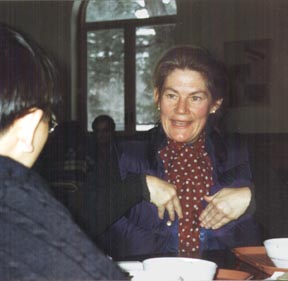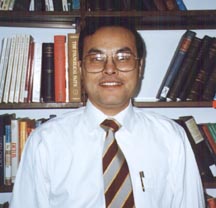
New Classes
Arts and Ministry
Dr. Sallyann Goodall is a senior lecturer in musicology and ethnomusicology
at the University of Durban-Westville in her native South Africa. She has
taught there for the past ten years with a two year break in 1991-93 to
attend UTS. In January, she took advantage of her summer break to return
to Barrytown to teach a class in Arts and Ministry.
 Dr.
Goodall sees her job as teaching people how to enhance their spiritual
lives through the arts and how to help others to do the same. She believes
that those who relate to the arts in some way will make good leaders since
they tend to have better insights into others. She usually teaches
students whose native tongues include Zulu, Xhosa and Sotho so the challenges
of communication in an ESL environment are not new to her. In fact,
she enjoys the diversity of her class of 11 students who come from seven
different nations. “They’re lively and they all ask questions and it’s
especially encouraging to see men who are interested in using arts in the
church,” she said.
Dr.
Goodall sees her job as teaching people how to enhance their spiritual
lives through the arts and how to help others to do the same. She believes
that those who relate to the arts in some way will make good leaders since
they tend to have better insights into others. She usually teaches
students whose native tongues include Zulu, Xhosa and Sotho so the challenges
of communication in an ESL environment are not new to her. In fact,
she enjoys the diversity of her class of 11 students who come from seven
different nations. “They’re lively and they all ask questions and it’s
especially encouraging to see men who are interested in using arts in the
church,” she said.
The Arts and Ministry class is divided into three concurrent parts. The
first is a historical survey of Western liturgical music with a particular
focus on the mass. Dr. Goodall sees this as complementing the Church History
course by tracing cultural development through Christian history.
The second prong of the class is practical, involving several modes of
expression including movement, painting and poetry. “We move between the
art forms which is why I used Natalie Rogers’ phrase “creative connections”
to describe this part of the course.” Dr. Goodall reports that some of
the students have experienced profound realizations during these periods
of self-expression.
The third prong deals with ministry and, more specifically, how to enhance
one’s ministry through the use of the arts. “We look at how to learn, teach
and direct songs and how to choose music which will complement an event
or service,” she said.
Missiology
“Am I here to establish a business, a newspaper, a church, God’s Kingdom……or
what? Do I relate to the few who can receive my message and detach them
from traditional cultural norms or do I relate to the ‘masses’ and moderate
my message accordingly? Should I be exclusive and demarcate clearly those
who are ‘members’ and those who are ‘outside people’? What is success?”
If these questions sound familiar and you’re still searching for answers,
Dr. Shawn Byrne’s new Missiology class may be for you. These questions
are among those listed in the class syllabus which goes on to explain that
the course “will help students clarify the relationship of their mission
to the religious and cultural contexts within which they function.” The
seminar-type course relies a great deal on case studies that depict dilemmas
in which a missionary may find him or herself. These dilemmas relate to
religious and cultural norms that the missionary finds strange or with
which he or she may deeply disagree. Each class features one case which
each student will have studied beforehand. One student is assigned to analyze
one case in light of Divine Principle and the Bible, to identify mission
principles and to present a solution to the dilemma posed. The entire class
then discusses and analyzes the case. Glory Umoh, for example, recently
had to deal with the thorny issue of polygamy but seemed to enjoy the opportunity
to grapple with the very practical questions of ministry.
Zen and Western Thought
Dr. Keisuke Noda has been a lecturer in Unification Thought for many years
and has most recently presented lectures in Godism to gatherings of the
Women’s Federation for World Peace in Washington D.C..  His
course on Zen and Western Thought attempts to give a clear explication
of the essence of Zen by clarifying its key insights against the background
of Western thought.
His
course on Zen and Western Thought attempts to give a clear explication
of the essence of Zen by clarifying its key insights against the background
of Western thought.
Dr. Robert Price is still covering for Dr. Richard Arthur who plans to
return next term. Dr. Price is no stranger to UTS; he attended some of
the NEW ERA-sponsored gatherings at the Seminary in the ‘70s and ‘80s and
he was also a classmate of Dr. Shimmyo while he was completing his doctorate
in systematic theology at Drew University in 1981. Like Dr. Arthur, he
is a member of the Jesus Seminar and has served as a church minister.